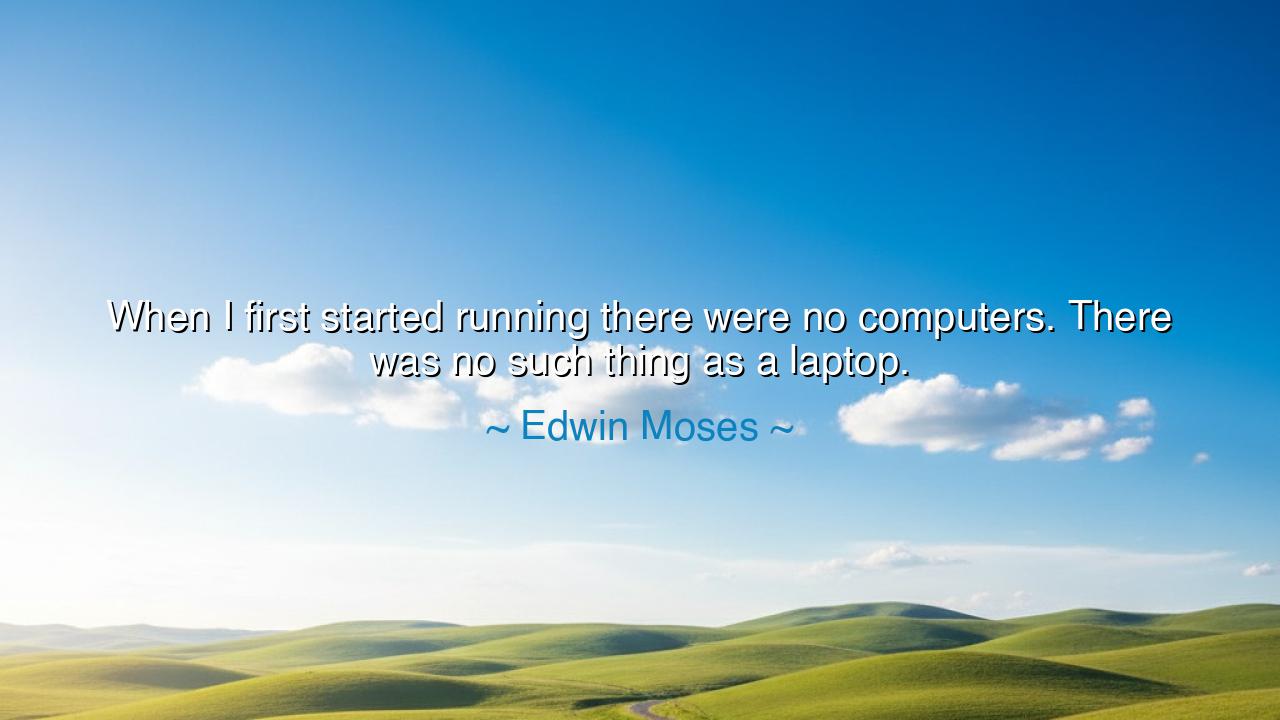
When I first started running there were no computers. There was
When I first started running there were no computers. There was no such thing as a laptop.






The words of Edwin Moses—“When I first started running there were no computers. There was no such thing as a laptop.”—speak not merely of time and technology, but of discipline, focus, and human mastery. They evoke an age when achievement relied not on digital assistance, algorithms, or data tracking, but on the rigor of the body and the precision of the mind. Moses’ reflection reminds us that greatness is born of the athlete’s commitment to practice, the warrior’s dedication to training, and the scholar’s devotion to study—unchained from the conveniences that modern machines provide.
When Moses began his journey as a hurdler, his world was one of simplicity and immediacy. The track was his laboratory, his stopwatch the only measure of time, and the repetition of steps the only path to perfection. There were no computers to analyze motion, no laptops to simulate outcomes. Every stride, every leap over the barrier, depended entirely upon his awareness, his effort, and his ability to learn from experience. This era demanded a purity of focus, an intimacy with the craft, and a resilience that could not be outsourced to technology.
The origin of this quote lies in the late 1960s and 1970s, when Moses began to dominate the world of track and field. In this period, data was recorded by hand, videos were sparse, and training methods were derived from observation, trial, and careful experimentation. Moses’ achievements—winning 122 consecutive hurdles races and setting multiple world records—were the result of meticulous attention to form, endurance, and timing, rather than reliance on machines or digital feedback. His words are a testament to the human capacity to excel through effort, discipline, and ingenuity.
This reflection echoes the wisdom of the ancients, who prized mastery of craft over reliance on tools. The sculptor of marble did not have laser guides; the archer of old had no sighting scopes. They honed skill through repetition, observation, and intuition. In the same way, Moses’ training required him to understand his body and its rhythms, to feel the arc of his leap and the cadence of his legs. His world was tactile, immediate, and demanding—a world where excellence was earned in the intimate conversation between human and task.
Consider the story of Leonidas, the Spartan king, who trained his warriors in the harsh lands of the Peloponnesus. The Spartans had no computers, no automated drills, no mechanical aids; they relied on the strength of discipline, repetition, and courage. Each soldier’s body was his instrument, his mind his guide. Like Moses, their achievements were not measured by technology but by mastery over themselves and their environment. The lesson is timeless: true skill, true greatness, arises not from the tools at one’s disposal, but from the deliberate cultivation of ability and character.
Moses’ reflection also teaches humility and perspective. In an age where athletes, students, and professionals rely heavily on technology, his words remind us that human achievement is not contingent upon machines. Computers can measure, simulate, and advise, but they cannot substitute for the hours spent on the field, the careful attention to technique, or the inner drive to surpass one’s own limits. The essence of excellence lies within the individual, not in the devices that surround them.
Therefore, the lesson is clear: mastery is forged in the crucible of focus, repetition, and self-discipline. Let your achievements be grounded in personal effort and observation, even when modern tools offer shortcuts. Whether running on the track, creating in the studio, or studying in the library, embrace the tactile, immediate, and often demanding journey toward excellence. Technology is an aid, not the arbiter, of greatness.
And so, my children, remember this: before the glow of screens and the hum of machines, men and women reached heights through their own sweat, mind, and perseverance. Take inspiration from Edwin Moses—train diligently, observe carefully, and master your craft through your own effort. For the triumphs that endure are not those made easy by technology, but those earned in the raw, unmediated struggle of human will and skill.






AAdministratorAdministrator
Welcome, honored guests. Please leave a comment, we will respond soon